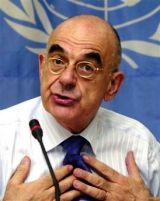UN envoy for Sudan says violence on the rise in Darfur
Sept 22, 2005 (UNITED NATIONS) — The top UN envoy for Sudan gave a sobering assessment of the shattered country Wednesday, warning that violence was on the rise in Darfur and that nations weren’t making good on their promises of peacekeepers and cash.
 The Lord’s Resistance Army (LRA), a Ugandan rebel group, has disrupted U.N. work in the south with new attacks, while tension in the capital, Khartoum, remains a concern, Jan Pronk said. U.N. humanitarian programs weren’t getting the funding they need.
The Lord’s Resistance Army (LRA), a Ugandan rebel group, has disrupted U.N. work in the south with new attacks, while tension in the capital, Khartoum, remains a concern, Jan Pronk said. U.N. humanitarian programs weren’t getting the funding they need.
Nonetheless, Pronk said he was encouraged that a peace deal signed in January between the Sudanese government and southern rebels remains on track despite the July 30 death of Vice President John Garang, a former rebel leader. Officials had fretted that his death could lead to new instability.
“I am as positive on north-south as I used to be, but I do not want to conceal that there are risks,” Pronk said in an interview. “LRA (Lord’s Resistance Army) is bigger than we thought and it’s important to say so.”
In a briefing to the U.N. Security Council earlier in the day, Pronk ticked off the long list of problems afflicting Sudan, a country that saw massive violence explode in Darfur in 2003 as the 21-civil war with Garang’s rebels was winding down in the south.
The U.N. launched a peacekeeping mission to help oversee the north-south peace deal but has left it to 6,000 African Union troops to bring stability to Darfur. The official say that the region has seen a decline in violence where the troops are stationed, while insecurity remains high elsewhere.
Pronk said he is still hopeful for a peace deal between the government and the Darfur rebels by the end of the year. He urged the Security Council to make clear that anything less is unacceptable.
“Parties are sometimes talking, and a day after, they’re shooting,” he said. “That is not the way to do it.”
Pronk said the region had seen a spike in violence in recent weeks and that rebels there are less united than they once were. Even so, peace talks underway in the Nigerian capital of Abuja have not broken off.
“So far, the AU (African Union) has been able to avoid an impact on the talks,” he said. “People stay at the table – a year ago they would have left.”
While Pronk linked some of Sudan’s trouble to Garang’s death, he suggested that the country’s many problems were far more widespread and the fault of the international community, bandits and the Sudanese government.
He said, for example, that humanitarian programs have been underfunded by 50% for 2005. Humanitarian and development programs have a budget of $1.9 billion this year, but have only received $950 million.
The Darfur conflict began in February 2003 when rebels from ethnic African tribes took up arms, complaining of discrimination and oppression by Sudan’s Arab-dominated government.
The government is accused of unleashing ethnic Arab tribal militia known as the Janjaweed against civilians in a campaign of murder, rape and arson. At least 180,000 people have died – many from hunger and disease.
The international community’s chief fault was getting involved too late, Pronk said.
“That is creating a situation which is getting out of hand, because the longer a situation like this is lasting, the more difficult it is to change it anymore,” Pronk said.
